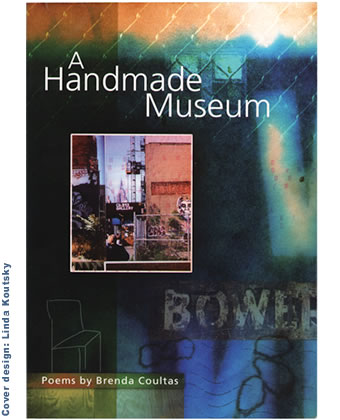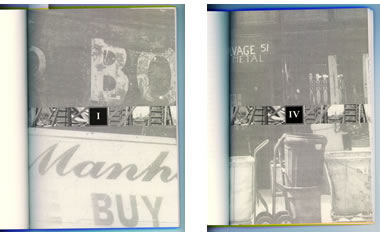
19 JULY 06
How has your first book changed your life?
18. Brenda Coultas

A Handmade Museum is my first book of poems. However, I wrote a book of short stories called Early Films in 1995, which prepared me for the reality of bringing a book into the world.
A Handmade Museum sold 600 copies, which is a lot for me. Early Films maybe sold 100 copies or less. I assume that the publishers, Rodent Press (Matt Corry, Judy Hussie) and Baksun Books (Jennifer Heath) who gave generously of their time, money, and vision, have a few hundred in their basements or have pulped the remainders.
In my hometown, my mother had some great plans for publicizing the book. We were going to present a copy to the library and call the local paper to snap a pic until my cousin called it porn which cooled my mom's jets. But she even defended the book, calling it art. Mostly my family was confused but kept it to themselves.
I promoted A Handmade Museum on my own by giving readings and by publishing excerpts online and in journals, including a Leroy Press chapbook edition of The Bowery Project.
During the writing of The Bowery Project, I photographed found objects and graffiti for a process journal. So when the book designer Linda Koutsky at Coffee House asked me for ideas about the design, I sent her copies of the photos, which she collaged together.

For A Handmade Museum, there were some wonderful reviews and a few hate-filled tirades. One reviewer based his review on the cover (really, he wrote about the design, blurbs, and biography, not about the writing) and compared it to the cover of a first book of poems by a corporate lawyer. The reviewer concluded by saying that because I had to write, the other poet's book was superior because, as a corporate lawyer, she had the option not to.
Another reviewer claimed that homeless people were boring, based on his experience, and unworthy as a subject. He wrote about how he hated the book even though he felt that the subject of dumpster diving and the Bowery was right up his alley but Coffee House Press had let him down with this waste of a good tree. On Amazon.com, in the reader's comment section, you can find a devastating review (I have the feeling that it's the same guy, based on the style and content of his ranting) and one in my defense by the amazing poet Megan Burns. The bad reviews were devastating and I called friends for support, but to a degree I felt the horrible reviews were a good sign, that I had touched a nerve, upset some people, and perhaps I'm proud that both books upset a few people.
The PSA award [Norma Farber First Book Award, 2004, for AHM] I don't know if that helped sales, only that they, The Poetry Society of America, buy copies for their members. But having Lyn Hejinian choose the book was the best reward. And for Coffee House Press, it helps them with their grant writing and fund raising.
My most disappointing moment was when I went with a few copies of Early Films in hand to the local independent bookstore thinking they would display it up front next to the other local poets, or in the window, but instead they took a couple of copies on consignment for the self-published rack in the back. I started crying right there in the bookstore, I lost control of my emotions. There were 2 book reviews of EF: the best part was a long positive review from Mitch Highfill in the Poetry Project Newsletter and that kept me going.
I don't think you can ever know how long the life of a book may be: just a couple of years ago a graduate student from Brown emailed me about teaching the book in a writing course. I was not able to locate enough copies, but I was very pleased to know that Early Films still has a life.
Many of my favorite books--for example, Studying Hunger and Memory by Bernadette Mayer, The Fast by Hannah Weiner, etc, published by Big Sky, Angel Hair, United Artists and other small presses--printed 500 or less. And those books have had a lasting impact. Sadly, many of those books are out of print. A copy of Studying Hunger will run you a hundred bucks now. I recently received a classic of investigative poetics from Ed Sanders, The Party: A Chronological Perspective on a Confrontation at a Buddhist Seminary. Published in 1977 by Poetry, Crime & Culture Press, The Party is the result of a student investigation into scandal featuring Trungpa Rinpoche that occurred at Naropa Institute in the 70s. This is another example of a book much talked about but hard to find because of distribution or volume, yet the conceptual aspect, of what can be considered as poetry, opens up the field, the imagination, even among people who have never read it.
I am pleased that AHM has been taught in universities and workshops as a model for investigative projects. It is fulfilling to be part of the dialogue of what a poem can be.
I would like to do less of the meat and potatoes teaching (composition). By the end of the teaching year, I go a bit nuts from having my head and dreams filled with teaching scenarios. I wish I was a more prolific writer. However, I am working at accepting my slowness instead of railing against it. That's part of who I am, I need time to gaze, to clear out mental clutter before threads and shapes become clear.
I have played around with a super 8 camera. I thought of film as poetry, as being concerned with beauty and image. I love Rudi Burckhardt's black and white films of NYC and his collaborations with poets. I consider the films of Jem Cohen, and David Gatten to be poetry. I took a basic super 8 class and realized, due to the expense of film and its fragility, that I could get lucky and create some interesting images but I was limited by my primitive skills. What I love about writing is that one only needs a surface and a stick to create worlds.
Poetry changes the world constantly, only not in the ways in which we expect or recognize.
:
A poem from A Handmade Museum by Brenda Coultas:
Boy Eye
My film began this way: A park on the East River, 4th of July.
Three fat ladies on the ground doing leg lifts and laughing. I bought a Pepsi.
I didn't know where to begin with recording the world so I started with skin. Then entire bodies, later rocks and flowers. Then onto gardens. There was land, water, and aluminum cans, barges, sea planes, and plastics yet to be recorded. I said I'd record every kind of animal 2 by 4. I went into this hoping to save something, like memory or coupons. I was trying to make sight important. I was making it important to see. I was making it important to describe. I was becoming a seeing eye artist.
In the park were men in go-carts, wheelchairs, and on foot. When news arrived of the third eye, I was elated. My foray into experimental organs had begun. I would be like the mechanical heart man, only I would have a fine eye. A boy's eye implanted on my forehead.
The eye arrived in a thermos of ice. My cold eye on rocks. Laid on ice like an oyster. I didn't kill the boy myself, he died natural and I didn't harvest it. I only ordered it through the mail from the back of a driver's license.
With the eye I saw people walking toward fireworks. I could see them all fully clothed but they could see me naked. It was very exciting to be totally naked in a crowd while wearing three eyes.
Soon the third eye atrophied. It had a reverse effect. Instead of recording the world the eye looked inward.
What did it see?
It saw highways. It saw rock cairns, piles of stones from the sea. It saw the last formations of the mound builders. It saw me mound building. I was very busy. I was building a shrine. I was making mounds for viewing. It was important for seeing.
What was your work? What was important to do?
It was important to walk across the Brooklyn Bridge at midnight, to thrift shop all fifty states and to ride a bike. It was important to hang out and be there. Being there was the best part. I was part of a history. I was a woman, I think. I was with other writers and we were working toward a collective vision, a melee of language and symbols. We were bookmaking. Our hands were speaking and collecting. The hands were breaking sound. It was important to write poems. It was important to hear music and eat. Sex was, sleeping was. Reading books, that was important, but most of all it was important to see you.
. . .
next interview: Frannie Lindsay
. . .